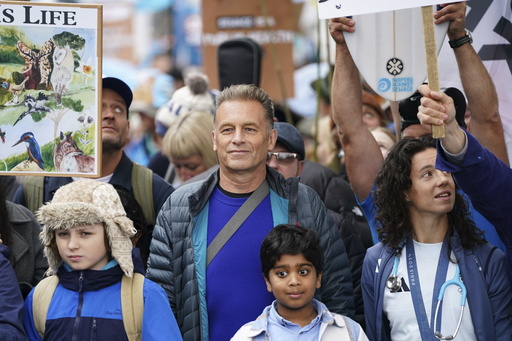
LONDON — On Sunday, thousands of demonstrators gathered in London, brandishing signs with phrases like “stop the plop” and “species not feces,” to call for a thorough cleaning of the nation’s polluted waterways.
Organizers estimated that around 15,000 participants joined the march along the River Thames, making their way to Parliament, many donning blue attire and waving blue flags, creating a visual representation of a “human river.” The police did not provide a crowd count.
The March for Clean Water was brought together by a coalition of organizations including Greenpeace, Friends of the Earth, and British Rowing.
Water pollution has emerged as a pressing concern in Britain, highlighting issues related to climate change and critiquing the privatization of the nation’s utilities that occurred several decades ago.
Private firms that manage both water supply and sewage treatment have lagged in updating their often outdated infrastructure, reminiscent of the Victorian era, even as the population has increased and demand for services has risen. Frequent leaks are noted, and in instances of heavy rain, companies often release untreated sewage into rivers, lakes, and coastal areas. The Environment Agency reported that discharges rose by over 50% last year, amounting to a staggering total of 464,000 sewage spills.
Additionally, agricultural runoff contributes to the contamination of Britain’s waterways, and climate change exacerbates the scenario through intensified rainfall.
Imogen Grant, a gold medalist at the upcoming 2024 Olympic Games, shared her personal experiences, noting that illnesses among rowers training on the Thames have become a common occurrence.
“It’s disheartening to see things like nappies and plastic bags floating in the water while we train. It’s simply unacceptable, and change is urgently needed,” she remarked.
Water companies have indicated that regulation by the industry oversight body prevents them from raising charges sufficiently to fund necessary infrastructure improvements.
The Labour Party, which took office in July, is pushing forward a legislative proposal to enhance regulations and introduce stricter penalties for water firms accountable for pollution. Nevertheless, the marchers argued that more proactive steps are required.
Nature broadcaster Chris Packham, present at the march, expressed concern over the state of Britain’s rivers, describing them as “among the worst in Europe.”
“Despite this disheartening reality, I hold out hope because we have the knowledge and technology to address these issues. What remains is to persuade our new government to take timely action,” he stated.
